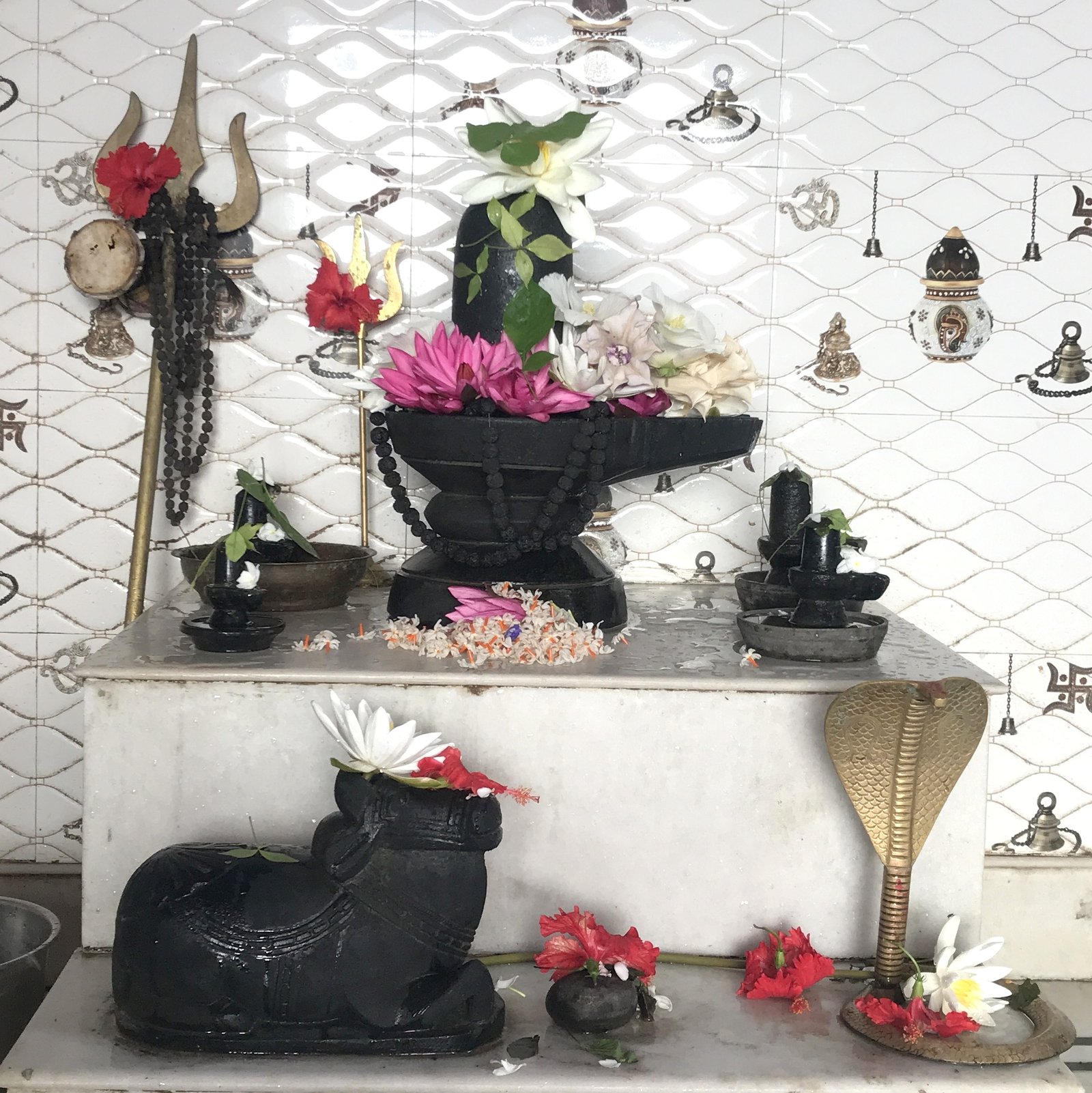

Nidaya Ghat
At the end of His twenty-fourth year, at the end of the fortnight of the waxing moon, Śrī Caitanya Mahāprabhu left Navadvīpa and crossed the river Ganges at a place known as Nidayāra-ghāṭa. Then He reached Kaṇṭaka-nagara, or Kāṭoyā (Katwa), where He accepted ekadaṇḍa-sannyāsa according to the Śaṅkarite system.
(CC Adi 17.272)
Although there was actually no need for Him to accept sannyāsa, He did so for the benefit of those who might think Him an ordinary human being. The main purpose of His accepting sannyāsa was to deliver the Māyāvādī sannyāsīs.
(CC Adi 7.33 purport)
When Śrī Caitanya Mahāprabhu decided to accept the renounced order of life, Candraśekhara Ācārya was informed of this by Śrī Nityānanda Prabhu, and therefore he was present when Lord Caitanya accepted sannyāsa from Keśava Bhāratī in Katwa. It is he who first spread the word in Navadvīpa of Lord Caitanya’s accepting sannyāsa.
(CC Adi 10.13)
When will I wander in the forest and come to the place of the siva-linga? Sitting there, I will meditate on Gauranga’s lotus feet, and then I will see a beautiful goddess not far off. When she notices me, I will pay my respects and ask. “What is your name mother?”
With tears in her eyes, she will reply. “Listen son, my sorrow is impossible to tell. There are five types of liberation, and I have been given the name of Sayujya, or Nirvana. My four sisters. Salokya, Sarupya. Samīpya, and Sarṣṭi, have gone to Vaikunthapura leaving me here embarassed.
“By the mercy of Siva, Dattatreya and other sages gave me their earnest attention for some time, but finally they gave me up and people say they took up residence in Rudradvipa. Uselessly I am now looking for them. Where and when will I find them? Gauranga has liberated everyone but is merciless to me. Therefore I will find a place to give up my life. That place will be called Nidaya [Merciless].”
Just hearing her name. Sayujya, my heart will tremble as if in fear of the witch Putana. In great fear I will close my eyes and drop to the ground. Then some great person will touch me, and I will rise and see before me the figure of Siva, dancing and singing out, “O merciful son of Saci, give mercy to all living entities. Drive away all fear!”
I will fall at Mahadeva’s feet and pray for my own purification. Being merciful, he will place his feet on my head and give me the essence of all teaching.
“Listen, devotion to Sri Krsna is the essence; striving for jñāna, karma, yoga, and mukti is useless. By my mercy you will conquer maya and quickly attain the shade of Gaura’s lotus feet.
(Sri Navadvipa Bhava-taranga)
After Caitanya Mahāprabhu accepted the renounced order of life, He very strictly avoided association with women. Even in His family life, He never played any jokes with women. He was very humorous, but only with men, not with women. Once He spoke some joking words with His wife, Viṣṇupriyā. When Śacīmātā, Lord Caitanya’s mother, was searching for something, He jokingly said, “Maybe your daughter-in-law has taken it.” But in His whole life these are the only joking words we find in relation to women. He was very strict. After He accepted sannyāsa, the renounced order, no woman could even come near Him to offer obeisances; rather, they would offer obeisances from a distant place.
(Teachings of Queen Kuntī – Chapter 10 The Property of the Impoverished)
So Caitanya Mahāprabhu had these two greatest attachment at home. Very affectionate mother. You have read about Śacīmātā’s . . . because He was the only . . . out of his ten children, only Caitanya Mahāprabhu was the living child of Śacīmā. So naturally she was very, very affection to his son, and this Viṣṇupriyā, wife, very, very affectionate, beautiful, young—but He gave up. This is called vairāgya-vidyā, no attachment. Although there is reason of attachment, but He had no attachment.
(760509 – Lecture SB 06.01.08 – Honolulu)
prabhu kahe-śuna, śrīpāda, ihāra kāraṇa
guru more mūrkha dehki' karila śāsana
(CC Adi 7.71)
"Yes. You are right, My dear Prakāśānanda Sarasvatī. You are right. But there is reason why do I do it. Now I can explain to you. When I took sannyāsa from My Guru Mahārāja, from My spiritual master, he found Me a rascal and fool number one, rascal." So guru more mūrkha dekhi' karila śāsana: "So, because he found Me a foolish person, therefore he has chastised Me."
Why? What is that? "He said mūrkha tumi: 'You are foolish. You have no education. You are illiterate.' " Tomāra nāhika vedāntādhikāra (CC Adi 7.72): "'It is not possible for You to understand Vedānta.'" 'Kṛṣṇa-mantra' japa sadā—ei mantra-sāra:" 'Therefore, You simply chant Hare Kṛṣṇa, Hare Kṛṣṇa, Kṛṣṇa Kṛṣṇa, Hare Hare. That will make You all right.'"
Now here is the point, that was Caitanya Mahāprabhu a foolish person? No. He was not a foolish person. In His childhood He was known as Nimāi Pandit, the greatest learned man. Even when He was sixteen years old, He defeated another very learned fellow from Kashmir. So He was reputed scholar, and He was known. And Prakāśānanda Sarasvatī knew it that Caitanya Mahāprabhu, even in His gṛhastha āśrama or in His householder life, He was a teacher of nyāya, logic, and He's great learned man. He knew it.
But Caitanya Mahāprabhu says that, "My spiritual master found Me a rascal, a fool. Therefore he said that 'You have no chance for understanding Vedānta. Therefore You take to this principle: chant simply Hare Kṛṣṇa, Hare Kṛṣṇa, Kṛṣṇa Kṛṣṇa, Hare Hare.' " What is this purpose of presenting Himself as fool and rascal? The idea is that in this age, 99.9% are fools and rascals; therefore it is very difficult for them to understand what is the purpose of Vedānta. He's representing Himself as one of the fools and rascals.
(670208 - Lecture CC Adi 07.69-75 - San Francisco)
